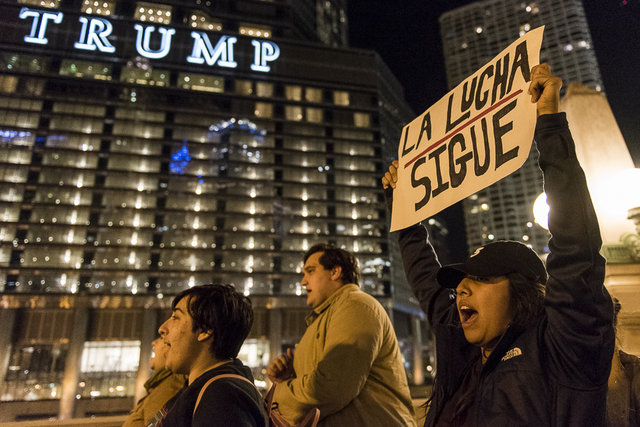There's No Such Thing As 'Routine' ICE Check-Ins For Fearful Immigrants In Chicago
By Stephen Gossett in News on Apr 18, 2017 8:00PM

Photo: Tyler LaRiviere
Thousands of miles away and months removed, the story of Guadalupe García de Rayos, and others like her's, still linger heavily in cities across America. García de Rayos is the formerly Arizona-based mother of two who was deported in February after what was once a standard check-in with immigration officials. In cities like New York and Baltimore, fear of ICE check-ins—which once felt customary for non-violent undocumented immigrants—are now causing waves of apprehension. According to immigration lawyers and advocates, that worry is burrowing in Chicago, also.
Immigration-related arrests in the U.S. have increased under President Donald Trump's watch, although they are still lower than figures at this time from 2014, during the Obama era, according to ABC News. Locally, there isn't evidence of increased enforcement in Chicago. But after Trump's hardline anti-immigration rhetoric and pledge to increase the categories of criminality under which deportations are conducted, immigration lawyers say they've noticed a pattern of fear among clients.
"I would tell you that [fear of check-ins] is much more common these days," Drew Elesh, a local immigration lawyer," told Chicagoist.
Elesh said:
"People were not that fearful a few years ago of an ICE check-in, but there are stories that circulate in the the national media of some people who are getting detained after a check-in—so word gets out, word spreads. People are more fearful in this environment. They're also afraid of reporting crimes, which they were not as fearful of a few years ago Because they're afraid a run-in with police is going to get them detained.The community is fearful, more than in the past."
But high-profile national stories to which Elesh alludes aren't alone in sparking worry here. In Chicago, the story of Francisco Lina remains forefront in minds. The 50-year-old mother of six had reported for years without incident but in March, a gut-punch ruling changed that course: "Immigration officers told Lino to return July 11, suitcases packed and plane ticket in hand. In other words, her deportation date is set," CNN reports.
But there are countless more tales of sustained fear among immigrant communities related to ICE check-ins that don't reach the headlines.
Mike Jarecki, the Chicago Vice Chair of the American Immigration Lawyers Association, said he luckily hadn't seen firsthand his clients missing ICE check-ins due to deportation fears, but he told Chicagoist that "absolutely, fear of ratcheting up enforcement has definitely trickled down to people who have to do routine check-ins" in Chicago.
"They're very concerned that what used to be routine is now going to turn into a detention or arrest," Jarecki told Chicagoist. "They're complying with the law, but now the rules have changed, and they haven't necessarily been informed and their life is turned upside down."
Jarecki said he was on standby for an East Coast client, a mother and recent arrival, who feared a meeting would lead to deportation. But "she was lucky, I think," and was spared. Like all of us, he said he and his colleagues are having to just wait and see who enforcement agents are in fact prioritizing when, according to some Homeland Security statements, "seemingly everyone's a priority," as Jarecki puts it.
Also, according to an excellent recent Tribune examination of the issue, lawyers say the tone of officials who conduct check-ins has changed, also, having grown curt and pointedly direct.
"You show up. And then they're telling you, 'We're detaining you today,' or 'We're giving you a new report date, but expect to (be deported),'" Kalman Resnick, a veteran immigration attorney, told the paper.
Jarecki also said some of his clients who are here legally, as permanent residents, have voiced considerable fear about visiting government agencies to which they are freely entitled due to the current climate. He agreed that there has been a change in tone from the Immigration and Customs Enforcement Office that has had an effect on clients.
"These are the same officers that were working before... But after Jan. 20, it seems that we're in a different environment, and these individuals have taken on the call to enforcement almost in a personal way," he said. "The tensions in how individual clients are spoken to and dealt with—and also attorneys, for that matter—have escalated."
Despite potential hostility and persistent fears, immigration lawyers stress that missing a scheduled check-in will only snowball more trouble. Seeking legal counsel and appearing for the ICE meetings remain the best option, attorneys said—even as the political climate makes that a grueling ordeal for many.